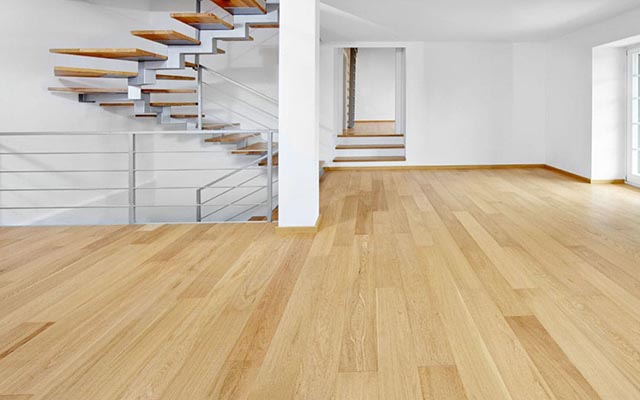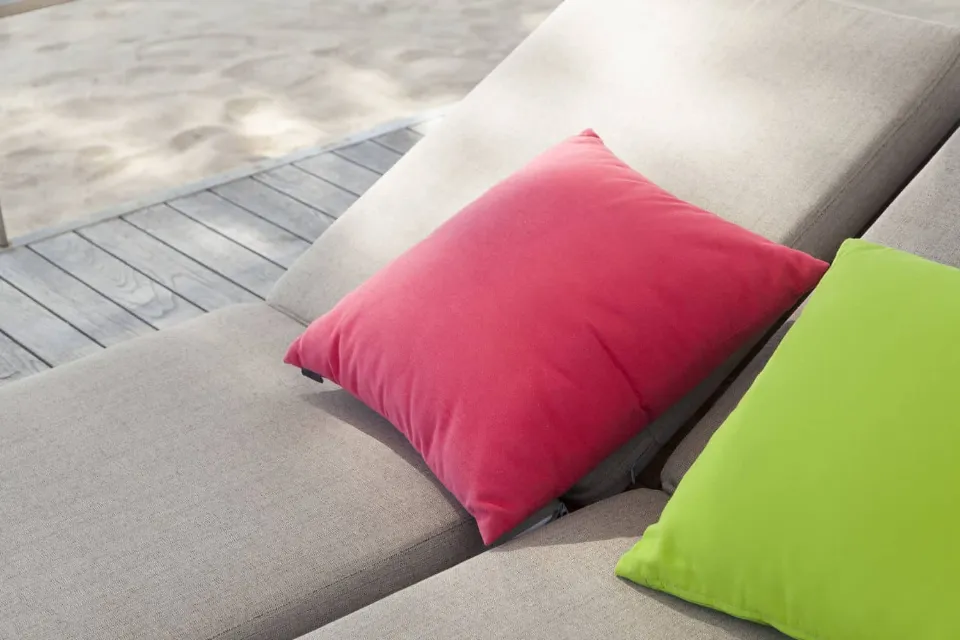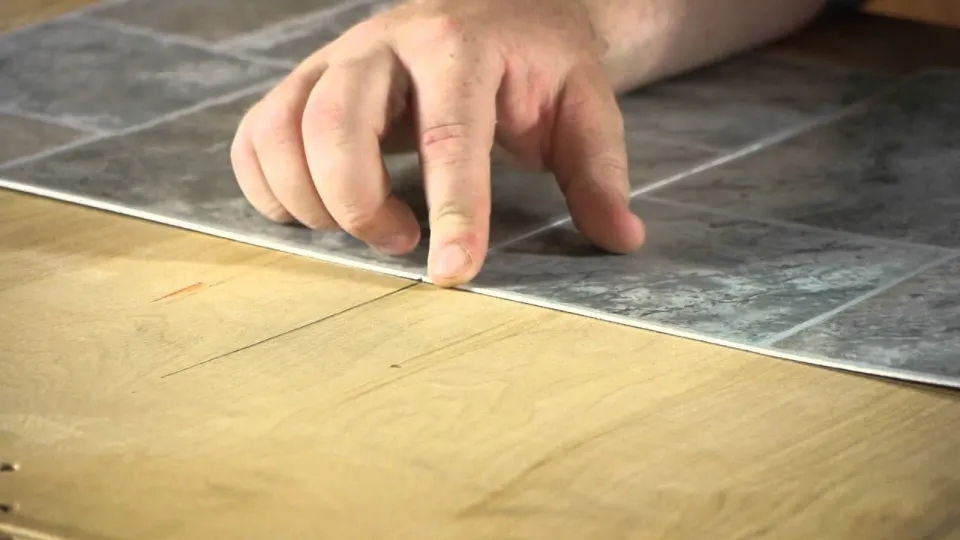Vinyl flooring is known for its durability. But, is vinyl flooring waterproof? In all honesty, it might decide whether or not you choose a certain type of flooring. Continue reading if you’re interested in learning the response to this and a few other questions.
Vinyl flooring is waterproof, but there is a lot more to it than you might realize. Water damage is a problem that affects all types of flooring. Your flooring would unavoidably sustain damage in the event of a flood in your home or if it was submerged in water for an extended period of time.
So, vinyl flooring is water-resistant because it is primarily made of plastic. Wet footprints, spills, and moisture are all easily handled by it.
Please read on for more detailed information.
Vinyl Flooring
Vinyl is a sturdy synthetic material that is used to create various types of flooring. Their main benefit is the four layers, which increase their use possibilities by providing durability and water resistance.
Instead of using another material as a base, a bottom layer usually made of foam or cork underlays the flooring.
Then, a waterproof coating is designed to absorb water without compromising the floor integrity. You can recognize two waterproof layer types, including:
- WPC– Wood plastic composite flooring is a combination of wood and plastic
- SPC– Stone plastic composite flooring is a combination of stone and plastic
An exterior printed image that resembles wood, stone, or marble is present on the third layer. It is covered by a wear coat that guards the flooring against harm.
Today, luxury plank and tile variations are available in addition to standard vinyl sheets, tiles, and planks. Instead of the four standard layers, this type of vinyl flooring has six to eight, including a foamy cushion layer that increases floor comfort and an additional protective transparent topcoat layer.
Is Vinyl Flooring Waterproof?
As there are many different types of vinyl flooring available, each with a unique set of qualities, answering this question can be challenging. Each of them is water-resistant, but only a few models are completely waterproof.
The most important thing to understand is that 100% waterproof engineered vinyl is used to create waterproof luxury vinyl flooring with a strong core. However, the level of flooring water resistance will be greatly impacted by the installation quality.
As an illustration, luxury vinyl planks and tiles are waterproof, but the issue is that they are not created in a single piece. The flooring will have several seams between the planks and tiles because it is necessary to stack them side by side.
Even though the planks and tiles are made of waterproof material, the improper installation will prevent the floor from remaining waterproof.
Contrarily, vinyl sheets come in a roll and don’t have seams, so they typically can withstand water damage regardless of the installation’s caliber. Just keep in mind that this particular type of vinyl flooring is only water-resistant, never waterproof.
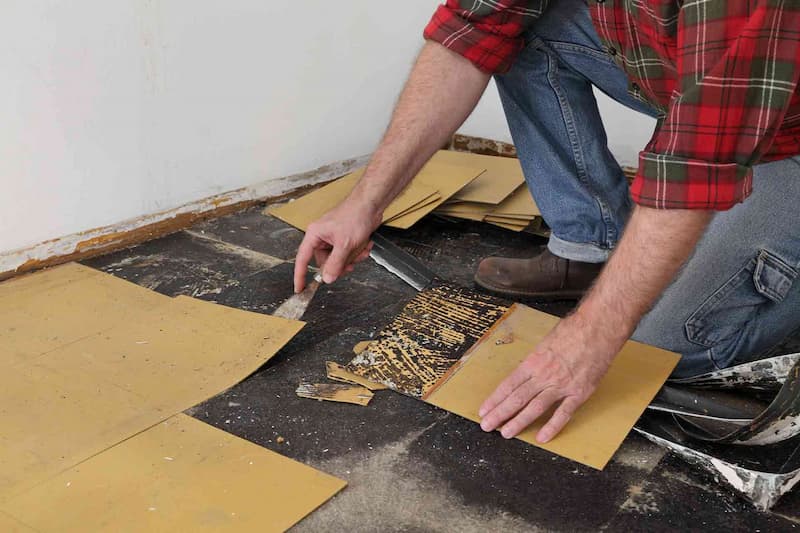
How is Waterproof Vinyl Flooring Constructed?
Vinyl flooring’s primary components are what really determine whether it is waterproof or water resistant. Luxury vinyl plank flooring is typically made of four layers of material, and if you want a vinyl floor that is completely waterproof, you must use an SPC or WPC product. Many WPC and SPC options also come with an attached pad (underlayment), which provides better sound insulation, increased comfort, antimicrobial protection, and the ability to install underfloor heating systems.
Waterproof Vinyl Flooring Layers
The feature that makes vinyl flooring waterproof or water-resistant is a core coat, one of four vinyl flooring layers:
Wear Layer
You should choose vinyl that has a wear layer that is as thick as possible because it shields the flooring from wear and scuffs. Because of its thickness, the flooring is more durable. The recommended wear layer ratings are:
Good – The vinyl flooring is for residential use when the wear layer is 6 mil thick
Better – The vinyl flooring is for light commercial use when this layer is 12 mil thick
Best – The vinyl flooring is for high-traffic commercial use when the wear coat is 20 mil thick
Printed Vinyl Layer
The printed decorative film between the wear and core layers is provided by this vinyl coat. It has the desired patterns, giving the vinyl surface a nearly identical appearance to wood, marble, stone, or other natural materials.
Waterproof (Rigid) Core
The crucial layer that ensures vinyl flooring’s most important qualities, including waterproofing, is the rigid core layer. Due to its high density, it won’t swell or change its properties when exposed to liquid.
You can find vinyl flooring with two core options:
- WPC vinyl core
This polymer composite or plastic and recycled wood pulp mixture is produced by manufacturers and is thick, moderately dense, resilient, and light. This core type of vinyl plank typically ranges in thickness from 0.22 to 0.31 inches (5.5 to 8 mm).
It successfully absorbs sound and is waterproof. It is also resistant to swelling when exposed to high moisture levels.
Since this product has an attached pad that increases space warmth, it is a great option for unheated areas like a basement. It is also the ideal choice for homes with multiple floors because it reduces noise transmission between them.
- SPC vinyl core
This solid polymer core is composed of stabilizers, powdered limestone, and polyvinyl chloride, and is dense, thin, compact, and dimensionally stable. The thickness of this core’s vinyl plank flooring ranges from 0.12 to 0.27 inches (3.2–7 mm).
It offers a typical stone appearance that many homeowners like and is strong, impact-resistant, and completely waterproof. In other words, this type of vinyl cannot swell due to topical humidity. It makes a fantastic countertop for a kitchen or home gym.
Backing (Base) Layer
This foam or cork backing layer is present in nearly all waterproof vinyl flooring products. It softens the surface, muffles sound, and saves you money from having to purchase an underlayment separately.
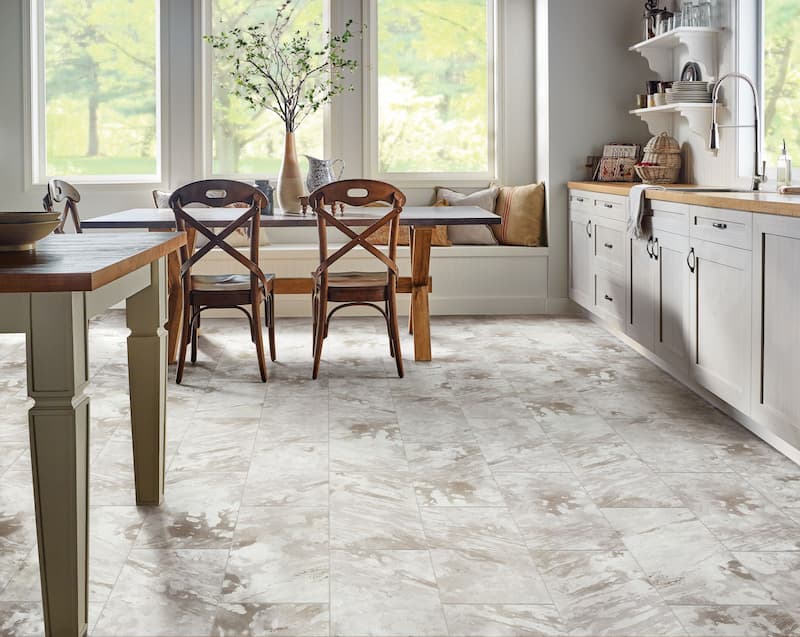
Install Vinyl Flooring
As I’ve already stated, the waterproofing capability of vinyl flooring is significantly impacted by the installation’s quality. There are two options available, but only one will meet needs if it is properly positioned.
Floating Vinyl Plank Flooring
If you are competent and ready for a DIY project, this installation option is a great choice. In this instance, there is no need for adhesive to attach the vinyl floor to the current surface. Just setting the planks down and allowing them to click together will do.
You don’t require a perfectly leveled floor as a base, which is a key benefit of this solution. To increase comfort and provide sound absorption, adding an underlayment is preferable in some cases.
Glue Down Vinyl Plank Flooring
Although you can use adhesive when installing products with the click-lock feature, some types of vinyl flooring require glue. You’ll get stronger flooring and more stability that way. When covering sizable areas, such as living rooms or basements, experts advise using this safety precaution to guard against possible shifting.
Tips for Keeping Your Vinyl Floors Clean
Vinyl flooring is incredibly resilient and simple to maintain. However, there are still a few things you should try to keep your floors as healthy as possible.
They will live longer if you keep them in good condition. You will be able to maintain your floors for years longer than you had anticipated.
Use a Doormat
Your floors will be shielded from dirt and gravel by keeping a doormat in front of any entrances. Your vinyl flooring will eventually become scratched and discolored from exposure to these elements, making it appear dirty.
Furthermore, place mats in front of any areas where you will be standing a lot. In front of your sink or bathtub are a couple examples of this.
You can prevent a lot of damage to your floors by wiping your feet on a mat before entering a space.
Wipe Up Messes
Even though your floors are waterproof, it is not advisable to let spills remain there. The spills will not only be more difficult to clean, but they will also call for more aggressive cleaning techniques. Your vinyl floors will become more scratched the more vigorously you scrub them.
You can avoid using any damaging cleaning techniques by cleaning up spills as soon as they occur.
Use Felt
Your floors are probably being scratched when you move your furniture. Put felt tips with adhesive on the bottoms of your chair and table legs to prevent this.
Avoiding rolling furniture is another thing you should be aware of. The floors will be damaged if you use felt tips on these.
Use a Nylon Brush
As previously mentioned, using abrasive cleaning techniques will always harm your flooring. Use a nylon brush if you do need to use one to clean a mess off your floors. These brushes will prevent you from damaging your vinyl flooring because they are softer than most.
Even though the nylon brush is soft, if you scrub it too vigorously, it could still scratch your floors.
Use Your Broom
Your floors’ glossy finish will be lost if you leave dust and dirt on them. As a result, it will appear worn-out or old. Additionally, cleaning the floor will take a lot longer as a result.
Cleaning your floors daily is the best defense against this. Sweeping, vacuuming, or mopping it are all effective ways to accomplish this.
Waterproof Vs Water-Resistant Flooring
Vinyl flooring typically offers significant moisture protection, but it is crucial to determine the difference between waterproof and water-resistant flooring options. Depending on your needs, you ought to select a specific kind. For instance, your selection ought to work in a basement, bathroom, and kitchen.
Water-resistant vinyl floor – Such a vinyl floor can withstand the typical spills and moisture that occur in every home.
Your flooring should remain intact for a while under these circumstances, but you should remove any standing water as soon as you can. Unfortunately, a basement flood caused by heavy rain or plumbing leaks cannot be tolerated by this vinyl floor.
Waterproof vinyl floor – This type of vinyl flooring, which is made of an impenetrable material, can withstand high moisture and standing liquid spills. No matter how long water is on the surface, this feature won’t change.
Remember that this flooring is resistant to topical moisture, but its waterproof properties don’t refer to water under the floor. Additionally, this floor is not flood-proof, so if it floods quickly, a lot of water will get underneath the waterproof floor surface through the unsealed vinyl cracks.
Summary
Despite being waterproof, vinyl flooring does not necessarily withstand flooding. The term “waterproof” refers to a vinyl’s ability to withstand surface water without becoming damaged. For homes and businesses that might experience spills and pet accidents, this makes it the ideal choice. For spaces like bathrooms and foyers that frequently see water, it is a great solution.
Due to its rigid core and premium wear layers, vinyl planks can be installed in your kitchen or bathroom. This layered construction allows this cutting-edge material to withstand significant daily wear.
